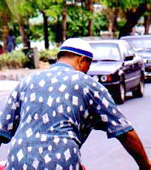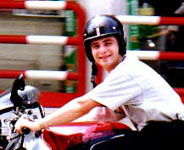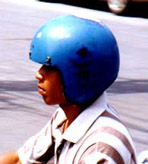





 



|
Family Money: Leaving it all
behind you
By Leslie Wright
Last week we looked at the first two items that should be included in a
Will - what you want done with your remains, and the appointment of an Executor.
The third item is to do with distribution of your assets to your heirs.
Who gets what, in other words.
If you fail to make a Will this ensures you won’t have any say in who
gets anything: the State will decide for you. And you won’t be around to argue.
In some regimes, even making a Will doesn’t ensure your wishes will
be carried out as you would like.
In some countries (the Philippines, for example), it is written into law
what minimum percentage of your assets goes to each child born in wedlock, and what
percentage goes to each natural child born out of wedlock whom you have recognised as
yours. Also, if you’re the father of such a child, a stipulated minimum will go to
the mother of that child or children.
This can cause all sorts of interesting problems, which can keep the
lawyers in clover for years.
In the meantime, your assets are frozen, and no-one can touch anything -
including your bank accounts. How your family is supposed to survive in the meantime is
not the legal fraternity’s problem, nor yours now that you’ve passed on. But it
could and perhaps should have been addressed while you still had the opportunity.
Potential solution
One of the ways not only to minimise the potentially high cost of
administration of your estate upon your death, but perhaps even more importantly to ensure
your wishes will be carried out exactly, is to place your assets, during your lifetime,
into a suitably worded Trust with a professional Trustee who has a transparent charging
structure.
However, each individual’s personal circumstances and objectives
should always be thoroughly analysed and expert legal and tax advice sought and taken
before embarking on this course.
This is especially important for expatriates living here, inasmuch as in
some countries - and Thailand is one - the concept of Trusts as we know it in the West is
not recognised. (And the concept of trust as we know it in the West is perhaps a bit more
dubious here, also...)
Keep it simple
If your estate is simple - a house, some cash in the bank, a modest
portfolio of investments - and your family comprises a spouse and a few children,
distribution is relatively easy.
You simply state in your Will that you wish your house to go to your
spouse for the remainder of her lifetime, and can either specify bequests to the children
(which will save any bickering over which painting or personal effect goes to whom), or
simply divide it up by percentages.
It would then be your Executor’s job to ensure this was done
correctly and fairly (which it is worth noting in some cases may require liquidation of
your investment portfolio.)
You could in theory specify that your house thereafter is to go to a
specific child, but again in theory, your spouse would have had to agree to this in
advance, inasmuch as he or she should have his or her own Will, stipulating distribution
of his/her assets after death, so could legally leave the house to anyone he/she wishes,
thereby negating your wishes, which wouldn’t hold up in law (unless the estate had
been put into Trust, and real property cannot usually be placed in Discretionary Trusts,
as it is too difficult to administer. Some type of US Trusts do, however, allow for land
or buildings to be placed into Trust, but these are a special variety and usually specific
to that item, and differ from the general Discretionary Trust discussed earlier.)
And you thought it was all so simple, didn’t you?
Taxes don’t stop even for death
The tax man loves it when people die. This always creates what they term
"a chargeable event", which means something has happened on which they can levy
a tax.
However, they only take some of your hard-earned assets, and let your
family inherit what’s left. Aren’t they kind?
In the U.K., for example, your spouse may inherit the principal residence
without tax, and your heirs (including your spouse) may inherit £215,000 tax free (under
current legislation) before paying any tax on the remainder.
However, the tax man will take 40% of whatever’s left, across the
board. Crunch!
However, if your spouse is domiciled overseas, she/he has an exemption of
£55,000.
On the other hand, transfers to and from certain trusts attract
inheritance tax at only 20%.
Therefore, if you have a substantial estate, it may well be worth while
considering placing those assets into Trust, simply for the potential tax advantages, not
to mention the other potential benefits - confidentiality, avoidance of probate
procedures, protection of minors, avoidance of forced heirship, avoidance of forced
repatriation of assets to regimes where exchange control regulations apply, avoidance of
sequestration by creditors... the list goes on.
And don’t imagine that just because you’re not British nor
living in U.K. you could escape U.K. inheritance tax if you happen to be holding U.K.
assets when you die.
A Thai (or anyone else for that matter) with a property or bank account in
the U.K. will, upon death anywhere, be subject to U.K. inheritance tax on those assets.
Someone with, for instance, £350,000 invested in the U.K. - say a house
worth £150,000 plus bank deposits of another £200,000 - will have to cough up £54,000
(40% of £350,000 less £215,000) to the U.K. tax man before his/her heirs could touch
those assets. Plus the cost of going through probate proceedings in the U.K.
Having put the cash deposits into Trust before your demise would reduce
this liability to no more than £40,000, since the property value falls within the
£215,000 nil-rate band, and the 20% tax on trust transfers would apply (assuming those
assets were withdrawn in the U.K. If drawn outside the U.K. your heirs might even be able
to escape tax altogether, depending on the assets in question and the circumstances.)
And this is perfectly legal tax avoidance, as opposed to the non-legal
variety, which is called tax evasion, and to which most authorities take a dim view.
The legalities
Okay. Now you’ve thought out who you want as your Executor, and
who’s going to get what, how do you write this out so it’s legal?
It is important to pay attention to the legal formalities required in the
execution of your Will.
A Will may be handwritten or typed. It really doesn’t matter so long
as it’s legible.
If you’re writing your own Will, write plainly and concisely how you
desire to dispose of your property.
Use plain words and avoid legal phrases or words which you do not
understand unless you’ve sought professional advice on the subject.
Alternatively, get a professional to do it for you, but make sure he fully
understands your wishes, as it is surprisingly easy to miss something out that was clear
in your mind, but wasn’t made clear to the person making your Will.
Omissions cannot be rectified if you’re not around any more to make
things clear!
Also, many ‘professionals’ are not equipped to write wills that
would stand up in court in another regime, and a Will should always be able to stand up in
court, as you won’t be able to.
While a Will can technically have alterations put into it before it is
executed, every alteration must be signed & witnessed, and the fact of these
alterations having been made should be noted in the attestation clause (about which more
in a moment).
Nothing should be scratched out or erased, or the Will might be
invalidated.
It is better therefore to rewrite the whole Will than to have any
alterations in it.
Witnesses
Next, you need to date and sign the Will in front of at least two
witnesses, who in turn must also sign it in front of you and each other.
Your signature should come right after the last line of writing, which is
typically the attestation clause *, and the witnesses’ signatures should come
directly underneath yours.
(*For those who want to know, the attestation clause is the legal
phraseology immediately preceding the Testator’s signature which typically runs like
this: "Signed by the said Testator (your name) in the presence of us, present at the
same time, who at his request, in his presence, and in the presence of each other, have
subscribed our names as witnesses." So now you know.)
However, the witnesses don’t need to know the contents of the Will;
they are only witnessing your signature.
Their names and addresses should be written in directly after their
signatures, and should also be clearly legible, as they may be called upon at a later date
to testify that the signatures are indeed theirs, and they did indeed witness yours, so
need to be contactable in that event.
However, it is important that neither witness is a beneficiary under the
Will, as bequests made to them would be invalid.
Also, your spouse or the spouse of any beneficiary should not be a
witness, as the gift would be altogether void.
Similarly, Executors should not witness a Will, as any bequest made to
them would then be void.
If the Will runs over two or more pages, and especially if it’s
typed, it is wise (although not legally required) to sign at the bottom or in the margin
of each page.
No stamp is required on a Will in English law.
Points to ponder
Persons under the age of majority (18 years in U.K.) cannot make a Will.
A Legacy to a friend is made void by his death before the Testator’s.
A Legacy to a Testator’s child or other issue does not lapse by his
or her death if he/she has any issue living at the time of the Testator’s death, but
the legacy takes effect as if he had died immediately after the Testator.
Under English law (and most others), a Will is revoked by marriage of the
person making it.
Except by marriage a Will can only be revoked by another Will, or writing
executed like a Will, or by destruction - that is by tearing or burning.
Drawing a pen across a Will does not cancel it.
Changing your mind
So now you’ve made a Will, and got it all straight about who takes
care of your affairs after you’ve gone, and who gets what.
A few years pass, and you have a falling out with one of your children, or
divorce your wife in favour of the younger lovely you met one evening in Pattaya who is
going to make you feel special and take good care of your every need for the rest of your
days, and has managed to produce one or more offspring in the process.
So now you want to change the distribution percentages you’ve
specified in your Will, or exclude someone altogether. How do you go about this?
I fact it’s quite simple.
All you need to do is write another Will.
Do not attempt to make a Codicil to your Will - that is, an addition or
alteration of its provisions. It is better to rewrite a Will than alter it, since this may
invalidate the Will altogether.
But bear in mind that your amended wishes may be contested by aggrieved
parties, and court wrangles can take years and a great deal of money to fight.
One solution to this potential problem is to place your assets into a
Discretionary Trust.
This will ensure your wishes are carried out efficiently and discretely,
without anyone - individual or government - having access to or knowledge of your assets
other than the Trustees.
While you are legally relinquishing ownership and control over your assets
to the Trustees, your Letter of Wishes (written at the time of establishing the Trust and
which can be amended any time thereafter much easier than making a new Will) enables you
effectively to control the distribution of these assets exactly according to your wishes,
and even long after you’re gone.
If you have any comments or queries on this article, or about other
topics concerning investment matters, write to Leslie Wright, c/o Family Money, Pattaya
Mail, or fax him directly on (038) 232522 or e-mail him at [email protected]. Further details and back
articles can be accessed on his firm’s website on www.westminsterthailand.com.
Leslie Wright is Managing Director of Westminster Portfolio Services
(Thailand) Ltd., a firm of independent financial advisors providing advice to expatriate
residents of the Eastern Seaboard on personal financial planning and international
investments.
Successfully Yours: Mark Laurence
by Mirin MacCarthy
Mark Laurence, at age forty, is young to be director of the
Laem Chabang School of Engineering. Even a short perusal of his background, though, gives
clues how he managed this. One factor stands out - in mid stride Mark discovered that the
solution to advancement was education. "I am passionate about education, because it
is the key, the answer to well being as an adult."
 Mark Laurence. Mark Laurence.
He has certainly proven this by personal example, as Mark says, "How
else could I go from leaving school at fourteen to becoming the director of an educational
institution in a foreign country?"
His initial feeling for his school in Sussex England was not passion,
however, but more of a love/hate relationship and he left early. Mark was not impressed by
his teacher’s parting shot to his father, "Mr. Laurence, your son will either
end up in prison or unemployed on welfare."
Keeping clear of the police and dole queues, he joined the navy at age
fifteen and spent the next eleven years afloat, progressing from rating to chief petty
officer. It was there he became involved in electronic engineering, maintaining navigation
and guided weapons systems. It was there, too, that he discovered he could not progress
any further without a degree. "I believed I was as good as many of the officers but
in the navy the only thing that stops you from getting the rings on your arm is a
degree."
Mark left the navy to ponder his future, but immediate domestic problems
took precedence. "I lost my job, my car, my wife, my house, all in six months."
A complete break was called for and since yachting was always something Mark was
interested in, having crewed on two Fastnet Races before he joined the Navy, he spent six
months crewing on an ocean going yacht in the Caribbean. However, six months and some
severe weather were enough for Mark to decide to return to the U.K.
After a short time as technical sales rep., his lack of the magic degree
became apparent again and he took the plunge and signed up for a four years science
honours degree in technology and design at the Brunel University. While there he also
completed a supplementary certificate in education.
Now armed with degrees and certificates Mark emigrated to Australia in
1991, having been impressed with the photos of Australia he had been shown as a child and
never forgotten. "I thought Australia was the best place on earth. It has clean air
and water you can drink, wide open spaces, good food and a huge middle class standard of
living with not much extremes of poverty."
Mark took a position coordinating the Open Learning Project for the
Eastern TAFE (Technical and Further Education), now part of Melbourne’s Swinburne
University of Technology. He has not looked back since, progressing to teaching
electronics and then deputy head to head of the department of manufacturing electrical
electronics.
The academic connection between Swinburne University and the Laem Chabang
School of Engineering made his next move fairly logical. He has been here for six months
now and loves it. "For me, this is success: being able to run an institution that
changes people’s lives. Here we aim to provide a learning environment that is
meaningful and provides an answer to students’ problems. I place an importance on
trust and respect that goes two ways. I believe that everyone, regardless of age, colour,
or creed, has the right to a fair go."
Mark’s advice to students of today is: "Do what you enjoy,
don’t listen to suggestions from anyone. Go with what you enjoy." Invaluable
advice from a contented young man and much more telling than the "wise words"
his teacher gave to Mark’s father all those years ago.
Snap Shots: Bad hair days
by Harry Flashman
Harry Flashman showed his latest batch of photographs to
she who must be obeyed and was told "You were certainly having a bad hair day then,
weren’t you?" Now since Harry here has this concept in his mind that he is an
artist, criticism of his art can hurt. Like down to the quick.
However, criticism is the Mother of Excellence, and we should never be
afraid of it. This can be difficult when you have the deeply in-built conviction that
there are only two sides to any discussion, yours and the wrong one! To improve, you have
to be able to look critically at your own work and see what you can do to improve your
standard.
Photography and photographs are the judged by the subjective response of
the viewer. They either like them or they do not. Successful photographers know how to
take photographs that are more pleasing to the majority of viewers than otherwise.
This ability is not something that they were born with - it is something
they learned over the years. This skill is yours for the asking. Believe me!
One of the greatest sources of all knowledge is in the written word. There
are lots of books published to assist the novice photographer who would like to improve.
There are three authors Harry can really recommend. John Hedgecoe, Michael
Freeman and the Kodak "How to take better pictures" series. All of these books
are written in plain English, without excessive use of Photographic Jargon. Sure, you have
to know how to recognise your f stop from your elbow, but you know that already. (If you
don’t, write to Harry Flashman, c/o the Pattaya Mail and I will send you the
answer confidentially in a plain unmarked brown paper envelope.)
Here is a simple and easy way to change your photographs for the better
this weekend. Harry’s Hot Tip - place the subject of the photo to one side rather
than dead set plumb in the centre. Ideally this should be one third in from either side,
but just not putting it in the middle is a start. Now, working on the principle that
westerners read from left to right - you will find they "read" photographs the
same way. So items in the left of the photograph represent the past and items in the right
represent the future. Still with me? Take a picture of a car on a road for example. Place
a car pointing to the right in the right hand side of the picture and it means the car is
going away. All the items in the left of the shot have already been passed and left
behind. Conversely, place the car in the left of the shot and the car has not yet reached
the items on the right.
Now imagine a hitch-hiker with the car shot. With the person on the left
and the car on the right, the car has passed, the hitch-hiker has been unsuccessful and
this is presenting a "sad" photograph. With the person on the right and the car
approaching from the left, the hitch-hiker is still hopeful. A "happy" shot.
Can you now see just how your photographs can tell a dynamic story, even
though one picture only represents a fleet split second of time? (Probably 1/125th of a
second!) Just by offsetting the main subject you have managed to improve and add interest
to your photograph.
All these tips, and lots more are available in the bookstore and it makes
good sense to buy a couple of decent reference books. In the meantime, place your subjects
off-centre this weekend and see what you get. Happy snapping.
Modern Medicine: Epilepsy
by Dr Iain Corness
The term "Epilepsy" strikes fear into the hearts of many people.
However, with modern treatment Epilepsy should not be thought of as an insurmountable
problem. It is also much more common than most people would imagine, with roughly around 1
in 200 adults having this tendency towards recurrent seizures.
The precipitating factor for an epileptic seizure is a disordered
electrical discharge occurring in the brain. This can be caused by many factors, including
heredity, trauma, tumour and a host of other factors including flashing light, temperature
and a vast number we just cannot explain.
The International League Against Epilepsy has divided epileptic seizures
into two main categories - Generalised and Partial Seizures.
The Generalised Seizure results from an acute discharge that affects the
whole of both cerebral hemispheres (the two halves of your brain) seemingly beginning
simultaneously on the surface of the brain.
A small discharge may produce only a momentary loss of consciousness with
very little muscular jerking. This used to be called "Petit Mal" seizures.
A larger discharge will produce muscular spasms, loss of consciousness and
a loss of sphincteric control (you pee yourself!).
With Partial Seizures, there is a defined area in the brain from where the
electrical discharge occurs. The pattern of the seizure then depends upon which part of
the brain the discharge starts from. This type is about twice as common as the Generalised
Seizure, and generally comes from a local disturbance in brain tissue, be it bruising,
thickening, tumour or disease.
Diagnosis does depend upon a complete history taken by a Neurologist (a
specialist physician) and special tests such as Electro-encephalograms (EEG’s).
Treatment is mainly through a range of anti-convulsant therapies including
the drugs Clonazepam, Phenobarbitone, Carbamazepine and Phenytoin. The one(s) to use
depend upon the type of seizure, severity and the frequency. Plasma levels are now done
regularly to ensure that the drug levels are within the therapeutic range, so things are
not so "hit and miss" as they used to be.
The outlook for an Epileptic patient is so much better than it was before,
with improved diagnosis and superior medication and monitoring. The important factor is
not to treat yourself, but get your local Neurologist to monitor your medication.
 Dear Hillary, Dear Hillary,
I have a problem. Don’t we all, but mine is a
specifically annoying one. If I were back in the efficient United States, I would just
throw a fit. But I realise that’s a no-no in Thailand. (Unless you’ve been
drinking a lot and then you can kill anyone and get away with it.) Oh, sorry.
Well, my husband and I have been in Thailand for about a week now and it
certainly is amazing. So very labour intensive. This is what mystifies me.
My husband and I go into restaurants, which are often empty, or only have
2 or three customers. We are greeted with delightful Thai smiles at the door. There are
usually about 15-20 waiters or an average of about 5 per table.
Then our menu comes. Our waiters and waitresses have the loveliest
arguments about who is going to serve us.
My husband, the cynic, says they are actually judging our ‘tip
potential’ and if it is not good, they will force the newest employee to wait on us.
That wouldn’t be so disturbing if they did wait on us. After being
very nice and giving us a half-hour to take a leisurely look at the menu, they take our
order.
We usually like to have a drink so we order that first so that it may come
beforehand and give us time to relax before our meal.
But the food usually comes about 1 minute after the drink. That’s not
the real problem. The problem is when we would like to order additional coffee or egg
rolls, the serving staff seems to have ‘had their plugs pulled’. They all
station themselves at various corners of the restaurant and stare out the window with
their backs to us.
This looks very charming when the beings in question are statues on a
Greek temple but it can be quite trying in a restaurant when one wants service.
I’ve tried waving my arms but the staff is so clever. They manage to
turn ever so slightly just when I get my arms going at ‘windmill’ magnitude.
This is very embarrassing, as the waiters don’t see me but passers by outside do and
often stop to watch my gyrations.
My husband finds this all very amusing. Being an old Yale man, he always
gets the staff’s attention by pretending he is throwing up.
Hillary, help! There must be a better way.
I’m trying to be,
Dignified and Decorous
Dear Dignified,
I know your problem well and you’re in luck. Having lived here so
long, I’ve developed some cunning stunts for getting the staff’s attention. One
is the accepted Thai way of raising you voice just slightly and calling ‘Nong’.
This is the proper term for addressing serving people, if you are one year older than they
are. The problem is that if pronounced on the wrong tone, it can mean ‘pustule’,
which is not very appetising.
The best way to get attention in a ‘non crowded’ restaurant is
to clink your fork ever so gently and melodiously against your water glass. Of course you
must beckon quickly, as serving staff often has a way of looking away very quickly once
they’ve identified the source of the sound. You are then left without.
If there should be some Thai customers seated near you, you could give
them a pleading look and they will call the staff for you.
But I feel that you must understand that ‘labour intensive’ is
rather self-defeating. The more staff a restaurant has, the easier it is to blame faulty
service on a colleague. I was shocked when I went to Germany and saw 2 waitresses taking
care of ten tables with ferocious efficiency.
Of course, you didn’t get the Thai grace or smile.
Enjoy your stay.
GRAPEVINE
| Internet saves
Fawlty Towers The power of the press has been
instrumental in flavoring the fish and chips at Soi 7’s favorite restaurant.
Following a Grapevine story about the dastardly Sarson’s vinegar thief, a bountiful
Internet reader has brought over a full year’s supply of the precious fluid as a
gift. A delighted Terry Clifton told us, "This kindness restored my faith in humanity
on an otherwise nondescript day." Or words to that effect.
Retirement visas
Immigration sources are repeating that the minimum Thai bank balance
required to apply for a new twelve months’ retirement visa is 800,000 baht. No
matter what your age, 55 (the minimum) or 95, this is the cash sum needed. If you fall
short of that - and complications then ensue - you must show clear written evidence that
your monthly pension is at least 65,000 baht. But these rules do not apply if you
had a retirement visa issued in 1998 when the sums were lower. As long as you do not allow
your retirement visa to lapse, officers will not expect you to show more cash than you did
last year.
Ruled Britannia
Mourners at traditional temples in Hong Kong are being warned to watch
out for fake monks who smoke cigarettes and go home to their wives to indulge in less than
perfect behavior. It seems that, since the British handover, fraudulent individuals have
been muscling in on locals’ income by blessing ceremonies which they are not entitled
to do. One Hong Kong resident realized something was wrong when his deceased father was
congratulated on his recent marriage.
That’s Pattaya
A lovelorn farang is baffled and bewildered after setting up home in
Central Park with the luscious girl of his dreams. Arm in arm, they journeyed down to the
communications center in Pattaya Klang to order a new phone for their dream home. His new
wife made life simple by filling in all the Thai forms as she periodically squeezed his
knee and pecked him on the cheek. A month later, he opened a bulky packet to discover it
was a phone bill totaling 36,872 baht. You got it. The direct debit order covered all the
phones of the lady’s innumerable relatives from Naklua to Jomtien. A helpful lawyer
pointed out that these matters take time and money to sort out.
Absolutely stunning
The news that balding Prince Edward, the Queen’s last single son
and TV (television) producer, is on the verge of marrying his girlfriend Sophie Rhys-Jones
caused chaos in the Pattaya quiz league last week. A whole section on Confirmed Eligible
Bachelors and Twentieth Century Queens was hastily withdrawn and replaced by the ever
popular Myths and Legends Of Our Times. Team member and beer swiller Ernest Horrocks, 67,
complained he did not understand what was going on. |
|
Hard up A poor man’s Viagra has appeared in certain Pattaya
establishments specializing in lewdish entertainment. Costing only 100 baht for a big
bottle, the idea is to pour some of the liquid into a bowl, add boiling water, cover your
head with a towel and inhale the fumes for exactly ten minutes as the mixture works its
wondrous hydraulic trick. Non immigrant "O" visa holder Reginald Coombs said,
"This stuff cost me a small fortune. When I took the towel off, the so and so girl
had disappeared with my wallet, a video recorder and my spare set of teeth."
The squat
From a straightforward Pattaya guide to losing weight for the over 40s.
"Using a bar weight and weights, say 65 kilos, start with the bar on the rack just
lower than shoulder height. With feet hip width apart, grasp the bar slightly wider than
your shoulders with the ribcage lifted and abdominals contracted. Now move down into a
squat until the upper legs are parallel to the floor, knees above the toes with the back
straight but leaning slightly forwards. Finally, move back to the starting position and
repeat to benefit buttocks, quads, hamstrings and miscellaneous muscles."
Alternatively, you could walk the dog more frequently.
To catch a thief
Eastern Seaboard house burglaries are on the increase. No easy answers.
Leaving lights on when you’re out does not stop would-be criminals ringing the bell
to check if anyone is home. Electronic alarms are fine if you remember to switch them on
and, equally importantly, if you know someone likely to take any notice of the ringing.
Also they need servicing by qualified personnel. High ornamental fences are a deterrent to
sneak thieves, but a really determined varlot will get in, often by breaking open the roof
or unscrewing a whole window. Most at risk are cash and small valuables, although farang
passports have an increasingly common second hand market in the criminal underworld.
According to police sources, most stolen possessions are found by robbers five meters from
the bed or beds which is worth thinking about. Safes have their pros and cons, but they
are a magnet for housebreakers. Smaller ones are often carried away and, if not, they may
indicate that you have something worth coming back for. Short of hiring a 24 hour guard
roster, the best insurance is probably never to leave the house without anyone in. Can be
difficult. If you have the sort of house insurance which covers contents, it is likely
that the purchase chits and serial numbers of electronic equipment will be needed for a
claim. This allows the police to check out the pawn shops from time to time. |
Animal Crackers: Buying Pets
by Mirin MacCarthy
Don’t
Fall in Love
If you decide that you must have a pet in your life
the worst thing you can do is rush off to a pet shop or weekend market and fall hopelessly
in love with that cute little ball of fluff over in the corner. Pets always have an impact
in your life, some of them can live long and be more expensive and disruptive than
children. Read up on your prospective adoptee first. Do you have room for a dog?
Dogs, similar to horses, need adequate housing,
training, constant grooming, veterinary care and daily exercise. Look at your reasons for
wanting the animal and choose an appropriate breed for your lifestyle. A longhaired dog
will need air-conditioned quarters in this climate and is out of the question if any of
the family has allergies or is unprepared for the daily brushing and combing routine. Like
rabbits, young puppies are surprisingly destructive and need lots of play and supervision.
Large, active dogs need constant exercise that may not suit apartment living or a busy
lifestyle. Try to buy from a breeder, see the whole litter if possible and choose the
strongest and boldest. The breeders’ or shop premises should be clean and the pups
bright eyed, with clean ears, cool moist noses, and clean, unsoiled bottoms. They should
move steadily, have firm bodies with elastic skin and clean coats. Never take a shy,
sickly or undersized pup because it is offered cheap. Dogs are the only animals that live
their whole life for man. Make sure you understand the commitment and responsibility
before taking it on.
Cats and Kittens
Cats are companionable, loyal, playful and sometimes
even possessive. Stroking a cat is reputed to be stress and blood pressure lowering. The
only choice to be made is pedigree and shorthaired or longhaired with the resulting
constant grooming needed. Thai cats, Korats or See Sawat’s, with their short, single,
non-shedding coats are ideal for this country.
Do you have room for a dog?
Dogs, similar to horses, need adequate housing,
training, constant grooming, veterinary care and daily exercise. Look at your reasons for
wanting the animal and choose an appropriate breed for your lifestyle. A longhaired dog
will need air-conditioned quarters in this climate and is out of the question if any of
the family has allergies or is unprepared for the daily brushing and combing routine. Like
rabbits, young puppies are surprisingly destructive and need lots of play and supervision.
Large, active dogs need constant exercise that may not suit apartment living or a busy
lifestyle. Try to buy from a breeder, see the whole litter if possible and choose the
strongest and boldest. The breeders’ or shop premises should be clean and the pups
bright eyed, with clean ears, cool moist noses, and clean, unsoiled bottoms. They should
move steadily, have firm bodies with elastic skin and clean coats. Never take a shy,
sickly or undersized pup because it is offered cheap. Dogs are the only animals that live
their whole life for man. Make sure you understand the commitment and responsibility
before taking it on.
Cats and Kittens
Cats are companionable, loyal, playful and sometimes
even possessive. Stroking a cat is reputed to be stress and blood pressure lowering. The
only choice to be made is pedigree and shorthaired or longhaired with the resulting
constant grooming needed. Thai cats, Korats or See Sawat’s, with their short, single,
non-shedding coats are ideal for this country.
Choose kittens that are bright eyed, active and alert with no discharge
from eyes, ears or nose. Avoid premises that are dirty, overcrowded or with any sick
kittens as disease spreads rapidly.
Hello Cocky
Before choosing a bird it is vital to research the
different breeds characteristics, care and feeding.
Macaws and cockatoos can be horribly noisy, destructive and attention
seeking. Other cute small birds are insect eaters, lovebirds and conures make ear
shattering shrieks and lorikeets an extravagant mess. Good choices for apartment birds are
cockatiels, canaries, budgerigars, and moustached, plum headed or Indian ring neck
parrots. Don’t buy from dirty, diseased premises; check to see that the birdcages
have been cleaned in the last twenty-four hours. Stand back and observe - healthy birds
are always alert, watchful, even a little nervous. Fluffed up sleepy birds moping in a
corner are extremely ill and/or dying. Choose a bird that is sleek and fully feathered
with no soiled vent or tail feathers and not sneezing or with laboured breathing.
Avoid impulse buying and select your pet carefully and then years of
shared fun can be the result.
Auto Mania: Benz goes round the
bend?
By Dr. Iain Corness
Made one of my rare visits to Bangkok the other day. Many
years ago, Bangers was my favourite city - it certainly is no more. It’s the city
that strangled itself with its own exhaust pipe. It is such a hassle to go anywhere that
you’d rather stay at home. Even on Sunday the traffic is horrendous. At least in
Pattaya the traffic always moves.
This time I didn’t even take the mighty Mira up to the capital -
it’s even too hard to try and park in Bangkok, let alone the problems of driving with
road maps on your knees.
But back to the story - saw the new A Class baby Benzes on display. Is
this some huge practical joke being played on the unsuspecting public? It is probably the
ugliest looking new car I’ve seen in the last decade! And a Benz?
Remember the Suzuki Swift hatch-back of a few years ago? The rear end is
pure Swift. The front, however, looks like a Swift that’s gone under the back of an
18 wheeler and has been pushed in all the way through to the windscreen.
 Plastic Ice Bucket. Plastic Ice Bucket.
For my money this car does nothing but cheapen the "image" of
Mercedes. Karl Benz must be revolving in his grave over this one. For many reasons, they
should market the little pus-bucket as a Chrysler, not as a Benz.
 Knit your own. Knit your own.
It reminds me of the gaffe Porsche made some twenty odd years ago when
some bright marketing person suggested that the new sports car they had designed as an
Audi should be rebadged and sold as a Porsche. This was how the dreadful 924 made its
presence on the streets. It was roundly derided by all Porsche enthusiasts and the factory
hastily threw away all the cheap Audi bits and substituted 911 brakes etc., and renamed it
the 944. Even today, all but the unknowing will turn their noses up at a 924, despite its
Porsche badge - even the 944 is only just acceptable.
 Look Mum, no straps (no brains?). Look Mum, no straps (no brains?).
The A Class Benz is one of these cars. At 2.8 million Baht, it is an
expensive way to buy a three pointed star. You would do better to prise one off the back
of a Nissan Diesel bus, all of which seem to have the famous badge. No, with the recent
merger, call it a Chrysler Light Bulb and let it die a natural death. It’s horrible!
A good image!
Must make mention of the taxi service up and back - we arranged for Image
Car Travel to take us. A clean, fully fuelled car arrived ON TIME at our home. The driver
was courteous and spoke English, so there’s a turn up for the books for starters.
 Fashionable strapless number. Fashionable strapless number.
As you can imagine, after 32 years as a motor racer, if anyone can be
critical of driving habits, it is me. Our driver read the road ahead at all times, so
there was no savage braking and accelerating. It was one smooth trip all the way. He did
well.
Little touches like reading material (no Pattaya Mail though, must
speak to them about that!) and grooming items on board meant we arrived in Bangkok as neat
as when we left home.
The trip back was just as good. Picked up at the Amari Boulevard on time
again and another easy trip. We both slept half the way, it was all so smooth.
 BYO Bandages. BYO Bandages.
It cost only a few Baht more to have the best, but for my money it was
well worth it. When you have tired of smelly cabs, smelly drivers and lack of service,
give Image Car Travel a call (038) 303087. Has my personal recommendation!
Rushing headlong into oblivion?
The guide books all tell me that "Thai"
means "free". Indeed, it is wonderful to be here to experience the freedoms from
legislative constraints that are all so present and pervasive in the so-called western
free societies. A freedom that the western world fought wars for, then legislated it out
of existence!
 Terylene and nylon model. Terylene and nylon model.
However, sometimes I do find myself caught on the horns of the proverbial
dilemma. There is nothing better than riding a motorcycle along Beach Road Jomtien, the
breeze in your face and hair (or what’s left of it in my case) and the feeling of not
a care in the world.
Unfortunately, my medical training leaves me in no doubt of the
consequences when you fall off. Brain damage is not fun. It is even less fun for your
relatives who have to take care of you thereafter! Undoubtedly, a good crash helmet will
stop the vast majority of cerebral catastrophes, and in the "free world" the use
of helmets is compulsory.
In Thailand it has also become compulsory to wear a helmet (even if this
only covers the rider and not the passenger!). My contention is then, if you HAVE to wear
a helmet - why not wear a good one? If the idea of the legislation is to protect the
motorcycle rider, let’s make that protection worthwhile.
Bell Helmet company over thirty years ago had the slogan "If
you’ve got a $10 head, wear a $10 helmet". Here in 1999 that can be translated
as "If you’ve got a 178 Baht head..." My own personal brain bucket cost
over $1000 in Oz, so you can see I’ve probably got an inflated idea of my
intellectual worth! However, I should have a good degree of protection if I do ever step
off awkwardly.
The same cannot be said for the 178 Baht model. Or for the plastic
ice-cream bucket models. Even a better grade bash hat is no good if it falls off in the
accident because the straps were not done up. A construction worker’s helmet is
designed to protect your head from falling objects, not for taking swan dives onto the
bitumen.
The message is clear. Wear a good helmet and do it up. Your relatives
might just thank you later.
The following pictures are representative of some of the styles of
"protective" headgear you can see on the streets of Pattaya. If you see
yourself, I am not throwing off at you personally, I am just using the picture as an
example. OK?
Fitness Tips: Time to step it up
by David Garred
Club Manager Dusit Resort Sports Club
G’day Pattaya, I can’t believe that it is time
already for the first intensity update for the year. Time is flying by.
Who is sticking with the program so far?
For those of you who are it is time to step it up a little.
In the interests of losing more fat, getting stronger, increasing your
muscle tone or even improving your cardiovascular fitness it is time to do a little more
work, or at the very least, change the way you are working out.
Why? - Ahhhh, the big question.
Let me explain this proven concept in layman’s terms.
The only way a body; loses fat, increases strength - the ability to move a
mass, increase muscle tone and / or improve cardiovascular fitness is by muscle
stimulation.
How does muscle stimulation help the body lose fat?
It actually burns the fat off.
The mobilisation of fat from its stores to the muscles for its use is
important in the control of bodyweight. During prolonged periods of exercise at moderate
intensity, fat is the major fuel source of ‘chemical energy’ within the muscle
so that it might be able to continue to perform physical work.
In practical terms, this means that stored fats are readily used as fuel
at low levels of exercise.
It does not matter if the muscle stimulation is voluntary or involuntary,
the fuel source is the same.
How do we stimulate our muscles?
Cardiovascular fitness requires a minimum of 20 minutes continuous (no
stopping and starting, racquet sports are out, sorry) exercise at a speed that makes you
breathe heavily (puff).
Fat burning and muscle toning exercise requires a minimum of 30 minutes of
continuous cardiovascular exercise at an intensity where you are sweating and still have
sufficient breath to be able to hold a conversation.
Strength training requires a regular increase in the amount of weight you
lift for the same number of repetitions. This will change both muscle size and density,
bone density, tendon strength and base metabolic rate.
Take another look at the end of the last sentence "increase base
metabolic rate", this means that the body, to maintain all it’s systems,
requires more energy to survive every day.
If you then ask those same muscles to perform some cardiovascular exercise
even more energy from fat will be burnt.
Finally, putting a regular change in the routine at every 6-week mark you
will constantly keep the muscles changing and developing, again you will compound the
amount of fat being burnt.
Alas, the variety is the hardest thing and this is the reason why I am
putting a reminder in to my articles every 6-8 weeks, so that you will keep up to your
maximum fat burning potential.
Carpe’ diem
Copyright 1998 Pattaya Mail Publishing Co.Ltd.
370/7-8 Pattaya Second Road, Pattaya City, Chonburi 20260, Thailand
Tel.66-38 411 240-1, 413 240-1, Fax:66-38 427 596; e-mail: [email protected]
Created by Andy Gombaz, assisted by Chinnaporn Sangwanlek. |
|